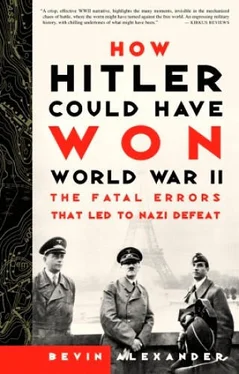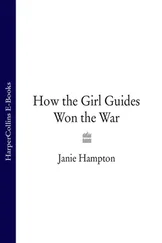Hitler didn’t consider the question of Crete seriously until the RAF landed air and army units on the island on November 1, 1940. Soon thereafter Hitler’s attention focused on Malta. After Marshal Graziani’s humiliating defeat, Hitler decided to send German forces to Libya. Mussolini, fearing loss of his possession, now wanted help.
Officers examined the possibility of neutralizing Crete and Malta solely by air raids. But any successful bombing campaign lasts only as long as it is continued. The only certain way to eliminate a threat is to seize the ground with troops, and Admiral Raeder and the navy high command agitated for an assault on Malta. Capture of this island, they asserted, was “an essential precondition for a successful war against Britain in the Mediterranean.”
Raeder and his senior officers were trying to reverse a preliminary decision of February 22, 1941, when the OKW informed them that Hitler planned to delay the conquest of Malta until the autumn of 1941 “after the conclusion of the war in the east.” Thus Hitler was expecting to dispose of the Russians in a swift summer campaign, then turn back at his leisure and deal with the small problem of Malta!
Several OKW staff officers—awake to the danger of Malta after the ship bound for Rommel went down—also pleaded with Jodl and Keitel to urge Hitler to tackle the island at once.
It was no wonder that they, Raeder, and his officers were wrought up. The decision ignored Rommel’s urgent needs and subordinated everything to a war against the Soviet Union—whose dimensions, duration, and outcome could not possibly be foreseen. Furthermore, the defending garrison at Malta was small, because convoys to the island had to run a gauntlet of attacks from Italian air and sea forces. Yet the British controlled the eastern Mediterranean and could put as large a force as they desired onto Crete.
Hitler’s final decision came on April 21, 1941, as the campaign in the Balkans was winding down. He decided to attack Crete, which was given the code name Operation Mercury. Malta would have to wait. Crete, Hitler declared, was more important. He wanted to eliminate all danger of British sea and air forces from southeastern Europe. British forces on Malta would be dealt with by the Luftwaffe. Furthermore, Barbarossa, the attack on Russia, was set for June 1941, and Mercury had to be completed before then.
With this decision Adolf Hitler lost the war. The assault on Crete guaranteed two catastrophes for Germany: it limited the Mediterranean campaign to peripheral or public relations goals, and it turned German strength against the Soviet Union while Britain remained defiant, with the United States in the wings.
Hitler was not the only leader fooled into thinking Crete was important. General Halder, chief of the army staff, showed how little he knew about supplying troops on an island in a sea dominated by an enemy fleet. Halder concluded that capture of the island was “the best means to support the advance of Rommel toward the Suez Canal.”
Winston Churchill also fell into the trap. He wanted to strengthen British forces on Crete, in the face of strong opposition from General Wavell, the Middle East commander, and the war ministry in London. The ministry feared heavy losses on Crete, since airstrips on mainland Greece were close and the Luftwaffe could bomb British bases with ease.
Churchill insisted, however, and beginning in February 1941 more British army troops moved to the island as construction crews built three RAF landing strips there.
Meanwhile, British intelligence picked up word that parts of 11th Air Corps—Kurt Student’s elite parachute and glider force that had overcome Holland in days—were arriving at Bulgarian airfields. But the British intelligence network was not clear whether the target was Crete, Syria, or Cyprus, a British island in the eastern Mediterranean.
Churchill on April 17 ordered some of the troops being evacuated from Greece to be disembarked on the island. General Wavell informed London that he only had sufficient troops to hold Libya and that he thought Crete should be abandoned, as did the Admiralty in London.
However, Churchill decided to defend Crete. He saw a chance of inflicting damage on German airborne troops, and believed a strong defense would have good effects on Turkey and other Middle Eastern states.
On April 30, Lieutenant General Bernard Cyril Freyberg took command of 28,600 British, New Zealand, and Australian troops, and 7,000 Greek army forces on Crete. Most of the men had been evacuated from Greece and had only light weapons. Freyberg sent frantic calls to Egypt for heavy weapons, but only a few arrived.
It was clear that the German attack had to hit the north shore. Here were all the main landing places and principal towns. Most roads ran east-west. Only a few rough tracks led south over the steep mountains that fell directly into the Libyan Sea.
Intelligence had figured the attack would come in the western part of Crete, and Freyberg posted the 2nd New Zealand Division around the village of Maleme and the airfield located near the seashore. He put about 14,000 British and Australians at Khania and Suda Bay, a few miles east to defend against a sea assault. At Rethimnon, thirty miles east of Khania, Freyberg posted the 19th Australian Brigade, and at Iraklion, forty miles farther east, he placed the 14th British Brigade. At all these points, Freyberg also positioned Greek forces as backup.
Mercury commander General Alexander Löhr divided his airborne forces into three groups: West, Middle, and East. In the first wave in the early morning of May 20, 1941, Group West was to land at two locations: Maleme, and around Khania and Suda Bay. In the second wave in the afternoon, Group Middle would drop just east of Rithymnon, and Group East on both sides of Iraklion. Once Maleme airfield had been secured, the 5th Mountain Division would come in by transport planes. General Wolfram von Richthofen’s 8th Air Corps had 280 bombers, 150 Stukas, 180 fighters, and 40 reconnaissance aircraft to cover the attack.
Richthofen’s aircraft began hitting the 40 British aircraft on Crete so hard early in May that the RAF removed all planes to Egypt. This gave the Germans complete air supremacy. They used it to pound every British position they could find, but British camouflage was so good the soldiers suffered few losses.
German air reconnaissance discovered a few days before the attack that strong elements of the Royal Navy had moved south and west of Crete. This showed that the British were determined to defend the island.
Thus on May 20 the Germans held command of the air and the British command of the sea. But the Royal Navy, with no air shield, was operating at high risk.
Preceded by early morning air attacks that knocked out some British communications and antiaircraft guns, the first wave of Germans came in on gliders at Maleme and south of Khania. Immediately afterward, paratroops dropped around the airport, the town of Khania, and docks at Suda Bay. All told, 6,000 Germans landed or fell out of the sky in this first wave. The British, New Zealanders, and Australians were waiting.
It was nearly a total disaster for the Germans.
Some gliders crashed before reaching their targets. Others landed but the troops were slaughtered as they emerged from the planes. Many of the paratroops jumped directly on defensive positions and were shot as they came down. One of the reasons this happened was the prevailing wind, which blew from the interior toward the sea. For fear of dropping the troops in the sea, the pilots tended to drop them too far inland—some of them actually in British lines.
The Germans came down with only light weapons. Because of intense fire, many could not reach the containers holding heavier weapons that had been dropped, but fell wide of the troops.
Читать дальше


![Джонатан Димблби - Barbarossa - How Hitler Lost the War [calibre]](/books/385421/dzhonatan-dimblbi-barbarossa-how-hitler-lost-the-w-thumb.webp)









